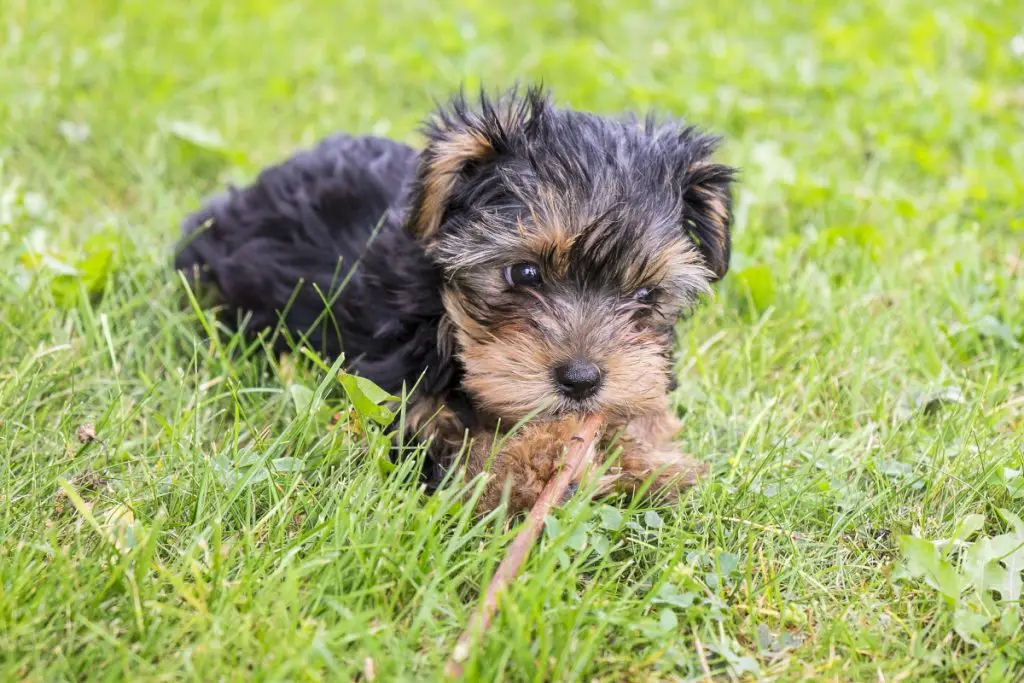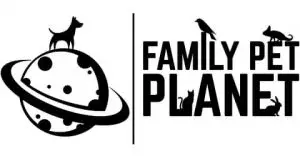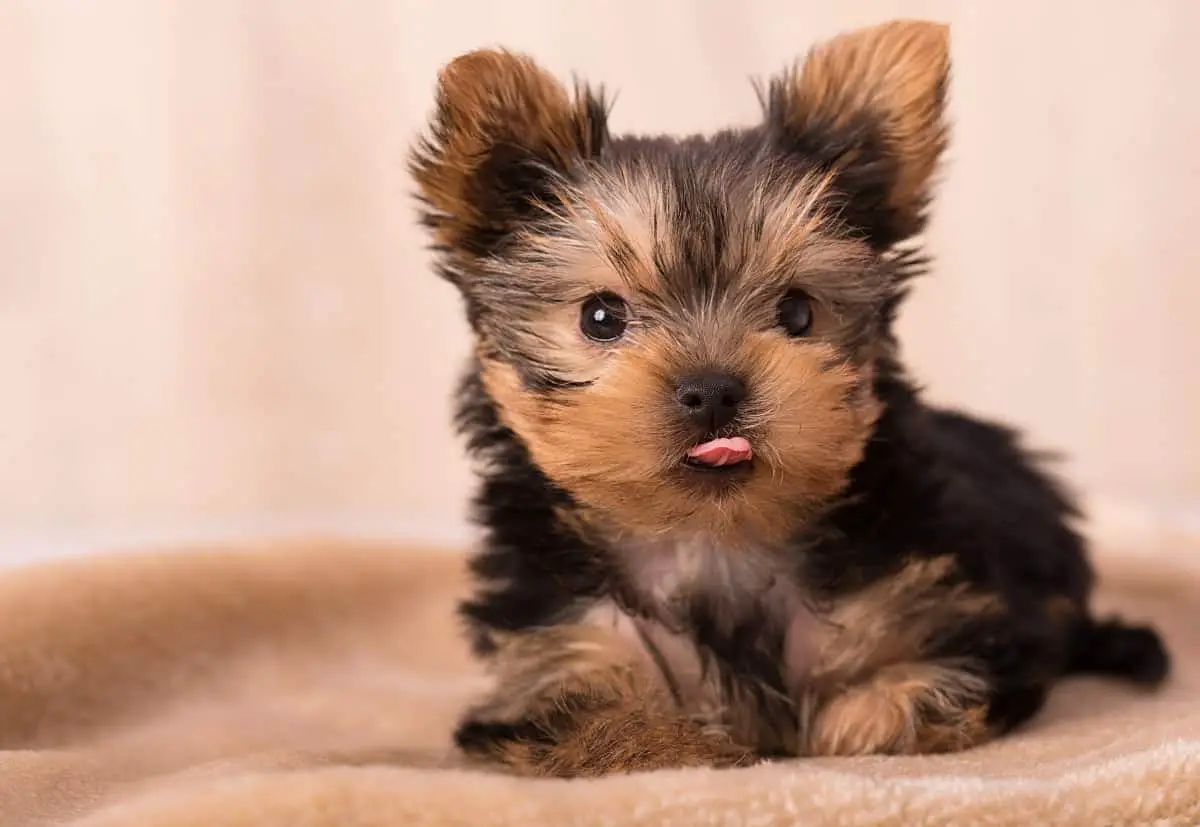Affiliate Disclosure: This post may contain affiliate links. If you make a purchase after clicking on these links I will be compensated at no extra cost to you. However, I never recommend anything I don’t love or wouldn’t use myself!
There are many attractive aspects to owning a Yorkshire Terrier. One of which is their low tendency to drool. Therefore if you have recently welcomed a Yorkie puppy into your home, you may be slightly alarmed or puzzled to see saliva dribbling from their mouth.
Why is my Yorkie puppy drooling? Yorkie puppies often drool when teething at 2-6 weeks of age. Drooling may also occur around the age of 4-5 months when Yorkies’ adult teeth begin to replace their milk teeth. Alternatively, your dog may have an oral injury or an underlying health issue.
Drooling while teething in a puppy is fairly normal. There are several ways you can help them get through it and also prevent bad habits from forming during their stage of wanting to chew. However, if your puppy is not teething there are potentially other causes to be considered and addressed. More on those later.
Why Is My Yorkie Puppy Drooling?
Excessive drooling in dogs is known also known as ptyalism or hypersalivation. While this trait is actually fairly normal and to be expected in some breeds, this isn’t the case with Yorkies.
There are a number of reasons why a Yorkie may be over salivating, some of which I will cover later in this article. However, for younger Yorkies, the most likely cause is teething.
Yorkie puppies begin to get their baby teeth or milk teeth between 2 and 4 weeks of age. By the time they reach the 5-6-week mark, all 28 milk teeth should be present.
At the 4-5-month mark, all those puppy teeth that grew will begin to be replaced by 42 permanent adult teeth. Drooling is just an unfortunate side effect of the discomfort your dog may be in.
Signs of teething include:
- Drooling
- Excessive chewing
- Pawing the mouth
- Leaving small blood spots on things they’ve chewed
Here is an estimation of when your Yorkie will grow their adult teeth:
- Four months: Incisor teeth
- Five months: Canine teeth
- Six months: Molars
- Eight to ten months: All permanent adult teeth should be fully grown
Providing Relief For a Teething Yorkie Pup

The best thing you can do for your Yorkie puppy while they are going through this growth is to provide them with some relief. Here are some things you can do to help your pup:
- Give them ice cubes – Slippery ice cubes are a fun game for your puppy to play while the coldness from the ice also provides their gums with relief. You can even add bone broth or fruit juice to the water for ice cubes to make them extra tasty and give them a little more nutrients.
- Dog toys for teething – Teething toys aren’t just for babies; your puppy can benefit from them as well. When choosing a toy for your Yorkie, you need to consider the size of the toy since this is a small breed. The texture should be made to feel good on the gums; small bumps on a toy is also a good thing to look for. This one is perfect (link to Amazon) and also very inexpensive.
- Distract them – Distracting them from the pain by playing with them can help them focus their mind on something else, but also prevents them from chewing on everything they shouldn’t chew on.
- Frozen carrots – Just like ice, giving your puppy frozen carrots to chew on can provide relief and also give them a healthy treat.
- Don’t let them chew on your hands – Although this may seem playful and they’ll often want to gnaw on your hand, it is best to avoid letting them do that in order to prevent bad habits which may not be so adorable in adult dogs.
- Puppy teething gel – If it seems like nothing is providing relief for your Yorkie, you can opt for some puppy teething gel (link to Amazon) for their gums. If they don’t let you rub the gel on their gums, you can rub the gel on a teething toy for them.
Caring For Teething Toys
Teething toys are no doubt great for teething Yorkie puppies, so it is important to keep a good variety around your house and even bring one with you when you are out and about.
But with teething comes a lot of chewing on toys causing those toys to be covered in bacteria and dirt, which can actually infect the gums. Here are some teething toy tips:
- Keep them clean by washing them in hot water with dish soap weekly
- Make sure they are always accessible
- Choose different size toys so that they can maneuver them to the areas where the pain is located
Preventing Bad Habits From Developing
Teething puppies are going to want to chew – on everything, including your hands, feet, and ankles. It is important not to let them develop these nipping habits, so it is beneficial to teach them not to bite at you and to chew on their toys instead. Here is what you should do if they try to use you as their chew toy:
- Say, “Ouch!” in a strong, firm tone. Puppies yelp at other dogs when they are bitten too roughly. Showing them that they nipped too hard is a good start in preventing them from doing it again.
- Give them a teething toy immediately after the nibble occurs. This shows them what is okay and not okay to chew on.
- Don’t yell at them loud enough to scare them. You don’t want to cause more stress during this already painful time.
- Distract them from wanting to nibble. Try playing games with them that don’t involve nibbling you such as fetch.
You can use these same tips to prevent them from chewing on shoes, furniture, or other items you don’t want them chewing on. If a puppy is allowed to chew on things that they shouldn’t normally chew on during the teething phase, they will most likely keep these habits even after the teething phase is over.
Puppy Proof Your House During Teething
While in this teething phase, you should take precautions of puppy-proofing your house. Not only will this avoid damage to the house but you may prevent your puppy from injuring themselves.
All electrical cords should be out of their reach. If they cannot be moved, a cord concealer should be used to cover them. Chewing on cords can really injure your pup and ruin whatever device the cord belongs to.
Keep shoes out of reach or in an area your Yorkie doesn’t spend a lot of time in. Teething puppies infamously love chewing on shoes and it’s not just a myth. I can personally testify to this having lost a couple of pairs in the past myself. Puppies may also choke on shoelaces or broken off pieces.
Anything you wouldn’t want your puppy to chew on should be out of reach. Never underestimate a teething Yorkie.
If you notice your puppy tearing at the carpet or chewing on any furniture, they should temporarily be kept out of these areas. Or keep your eye on them while in these areas and take the steps needed to distract them from wanting to chew on everything.
Dental Care For Yorkie Puppies
Regular dental care for your puppy, especially during this teething time, is very important. Decay, tartar, and plaque buildup can affect the proper alignment and health of the adult teeth they have coming in.
Sometimes a puppy can develop a double row of teeth if one of the baby teeth are too stubborn to come out. A lot of the time, if this happens, a trip to the veterinarian may be necessary to remove that stubborn tooth. If this is caught early enough, the adult tooth will be able to move to its proper place.
Due to their small jaw size, the Yorkie breed is more prone to dental issues and tooth decay which can lead to other serious issues:
- Bacteria can build up and enter the bloodstream
- Tooth loss which can lead to a lack of appetite
- Great pain
Dental care should begin as soon as you bring your puppy home with teeth brushing every day. Teeth scraping may also be carried out once every six months.
Yorkie Puppies May Drool When Stressed or Stimulated
While drooling in puppies is likely to be caused by teething, there can be other situational causes.
One of the main reasons saliva is produced in dogs is to aid with the ingestion and digestion process. Therefore seeing your dog drool around mealtimes or at the sight of a tasty treat is to be expected.
What isn’t so widely known is that dogs can often drool when they are stressed. If it’s the first time your Yorkie is in a new situation (which is fairly common for younger Yorkies) they may feel stressed and may drool as a result. Some other behaviors which you may witness when your dog is under stress are:
- Excessive yawning (particularly prolonged yawns)
- Excessive licking
- Ear positioning (typically pinned back)
If you notice these behaviors alongside your Yorkies drooling, you may be able to gain more of an understanding as to what may be causing it.
Deeper Health Issues Relating to Drooling in Yorkie Puppies
The teething phase should only last a couple of months, and it’s normal for your Yorkie to drool, chew, or have some blood during this time. However, if this is an ongoing issue or if your Yorkie drools or bleeds excessively then you may need to plan a trip to the vet.
Teething can also make puppies feel nauseous, which can cause a decrease in appetite, an upset stomach, or unusual stools. If these symptoms persist, a vet visit may also be beneficial.
Here are a few other possible causes for drooling in Yorkie puppies:
- Injuries to the tongue or oral cavity
- Trapped foreign bodies in mouth, gums or throat
- Specific metabolic conditions
- Insect stings
The above causes can affect older dogs too, however, there are a couple of other causes which usually only manifest themselves in older Yorkies:
- Various dental diseases such as Stomatitis or gingivitis
- Tumors, tongue erosions or ulcers
Again, if you suspect any of these issues a trip to the vet is most likely necessary. If you’re interested in more information relating to these issues check out this article on petplace.com.

